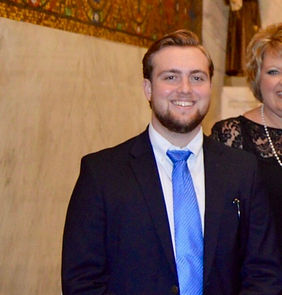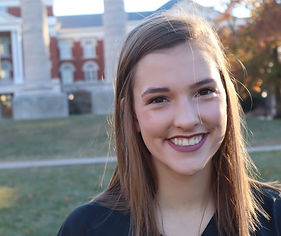
Amendment 2
Legalizing Medical Marijuana in Missouri
The 2018 NORML Cannabis Conference featured a group presentation by the NORML Board in Allen Auditorium on November 10, 2018. NORML is the National Organization for the Reform of Marijuana Laws. According to the group’s website, their mission “is to move public opinion sufficiently to legalize the responsible use of marijuana by adults, and to serve as an advocate for consumers to assure they have access to high quality marijuana that is safe, convenient and affordable.”
Photo by Tristen Rouse
On Nov. 6, 2018, Missouri voters passed Amendment 2, legalizing medicinal marijuana in the state of Missouri, making it the 32 state in America to do so. The new amendment places a four percent sales tax on the new drug, revenue that is set to be spent on services for America’s veterans. According to the initiative, state-licensed physicians are able to prescribe marijuana to patients with any one of the nine debilitating illnesses, including cancer, PTSD, Parkinson’s, epilepsy and chronic pain.
Amendment 2 requires the state Department of Health and Senior Services to start accepting applications for medicinal marijuana within 180 days after the Amendment takes effect on Dec. 6, 2018 (no later than June 4, 2019). Applications for dispensaries are set to be accepted no later than 240 days after Dec. 6, 2018 (no later than Aug. 3, 2019).
2018 Missouri NORML Cannabis Conference
Photos by Tristen Rouse
 |  |  |  |  |  |  |
|---|---|---|---|---|---|---|
 |  |
Following the legalization of marijuana, the National Organization for the Reform of Marijuana Laws (NORML) and Show – Me Cannabis sponsored an all-day conference on the University of Missouri campus. Speakers, with backgrounds from lawyers to medical professionals, came from all across Missouri came to speak about different aspects of the Amendment.
“We got this thing passed, but now we have to work on where it’s going to go,” former U.S. Attorney Barry Grissom said about upcoming legislative regulations on the newly legalized drug. The legalization is so new that many patients and care givers are unsure what kind of regulations are going to be placed on them, nor their level of severity.
A large concern among patients and activists is the criminalization of the drug. Jeff Mizanskey, an active pro-marijuana legalization activist spoke at the NORML/Show-Me Cannabis conference in early Nov. and told his story. Previously sentenced to life in prison without the possibility of parole, Mizanskey served 21 years of that sentence for the conspiracy to sell marijuana. He is the only man to be sentenced to serving life in prison in the state of Missouri for a nonviolent, marijuana-related felony.
Marijuana is still illegal under federal law. However, since states have been able to make their own decisions without federal interference, the distinction between federal law and state law has become a fine line. Ten states have legalized recreational and medical marijuana; 33 states have only legalized it for medical purposes with regulations for how much each patient is allotted, where it can be ingested, age limits and more.
Dan Viets
Dan Viets poses for a portrait at the Tiger Hotel on November 27, 2018. Viets is a criminal lawyer based in Columbia, specializing in the defense of marijuana cases. He is also the Communications Director for the Mid-Missouri chapter of the National Organization for the Reform of Marijuana Laws.
Photo by Tristen Rouse
When the amendment takes effect on Dec. 6, Missouri law will state that qualifying patients can legally possess up to four ounces of marijuana per month. However, the cost of a prescription of marijuana is a large concern for patients. In order for insurance companies to cover it, medicinal marijuana needs FDA approval. The Controlled Substances Act set in place by the federal government considers marijuana a Class I drug. This class is defined as having no medical value and a high danger to addiction.
As of this year, the FDA is yet to show any signs of approval, bringing up the question of access for lower income patients. The St. Louis Post-Dispatch reported on Thursday, that Missouri Gov. Mike Parson’s administration has not decided whether thousands of Missouri welfare recipients will lose their benefits if they use medical marijuana.
Lonnie Kessler
Lonnie Kessler poses for a portrait in his apartment in Moberly on December 1, 2018. In 2007, Kessler had a softball-sized tumor removed from his brain. As result, he lives with multiple conditions, including gastroparesis, nausea and epilepsy. Kessler campaigned for medical marijuana in Missouri and hopes that cannabis can alleviate his symptoms, so he can reduce the number of pharmaceutical drugs he takes and return to work.
Photo by Tristen Rouse

Under the Temporary Assistance for Needy Families program (TANF) - administered by the Department of Social Services - officials are required to ask applicants about illegal drug use. If recipients do not pass a drug test, they will not receive benefits for themselves for 3 years. “The Department of Social Services is currently studying the issue and will make a decision on how to proceed at the appropriate time,” spokeswoman Rebecca Woelfel told the St. Louis Post Dispatch.
Missouri voters passed Amendment 2 by 66%, on Nov. 6, legalizing medicinal marijuana and amending the state constitution. The initiative officially takes effect on Dec. 6, 2018, but it will be until Dec. 2019 before dispensaries get approval to begin growing and selling marijuana to patients.
By Alexis Metcalfe
December 3, 2018
Meet the Team

ALEXIS METCALFE
Writer and Editor
Alexis Metcalfe is a second-year journalism student at the University of Missouri specializing in public relations and working towards a minor in business. Originally from of suburb of Chicago, she currently works at NBC's KOMU8 in Columbia as a producer.

TRISTEN ROUSE
Photographer and Infographic Design
Tristen J. Rouse is a second-year photojournalism student at the University of Missouri. Tristen hails from the Springfield Missouri area. In Columbia he enjoys drinking coffee and picking up odd jobs from the Columbia Missourian.

JACOB LANG
Videographer
Jacob Lang is a fourth-year student at the University of Missouri majoring in Broadcast Journalism with a sports emphasis. Jacob was born in St. Louis, but grew up in Paducah, KY. Jacob works at KOMU reporting on local sports and anchoring on Thursday mornings. He also hosts “This Week in 23 Sports”, a weekly Mizzou-focused sports show, on MUTV.

ALEXIS GODSEY
Audio Technician
Alexis Godsey is a second-year journalism student at the University of Missouri specializing in strategic communications. Originally from Arkansas, she enjoys taking care of her dog, Khloe and working at a production assistant at KOMU.

